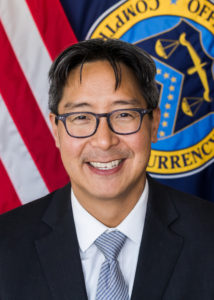
Acting Comptroller of the Currency Michael Hsu says new rules and credible enforcement threats are needed to bring the overdraft reforms his organization seeks.
Hsu, who made the comments Wednesday during an address before the Consumer Federation of America’s annual conference, said the OCC has undertaken its own review of bank overdraft programs and identified several options to modify or recalibrate their programs:
- Requiring customers to be able to opt into overdraft programs and providing a grace period before charging them overdraft fees.
- Allowing for negative balances without triggering an overdraft fee, and offering consumers balance-related alerts.
- Providing customers with instant balance information and linking checking accounts to other accounts for overdraft protection.
- Collecting overdraft or non-sufficient funds fees from a consumer’s next deposit only after other items have been posted or cleared, and not charging multiple and separate overdraft fees for multiple items in a single day.
- Not charging additional fees when an item is presented multiple times.
Current overdraft system ‘regressive’
Hsu noted the Brookings Institution’s recent finding that the existing overdraft system is “regressive,” creating structural barriers and increasing costs to lower-income customers. “For those living paycheck to paycheck, the flexibility offered by low- to no-cost overdrafts can empower them to pay their bills on time, avoid high-cost alternatives, and improve their credit profile. Therefore, our goal should be to improve people’s financial health — i.e., their ability to spend, save and borrow so that they are empowered rather than hindered,” Hsu added.
CFPB Director Rohit Chopra has pledged to take a stronger stand against bank overdraft and non-sufficient fund fees by enhancing supervisory and enforcement scrutiny of financial institutions “that are heavily dependent on overdraft fees.” CFPB research recently revealed that smaller banks are charging 13.2 percent less in overdraft fees than financial institutions with $1 billion or more in assets. Small banks with an overdraft program on average make $40.37 in annual overdraft revenue per account, 11 percent less than large banks, respectively.
By 2015, overdraft and NSF fees comprised a majority of account fee income for banks, more than doubling aggregate maintenance and ATM fees. Consumers and consumer organizations have called for reforms and filed lawsuits. Concerns arose over “unclear disclosure of items and conditions, automatic enrollment, and deceptive marketing,” Hsu noted. A 2017 Consumer Financial Protection Bureau study found that 9 percent of account holders who had used overdrafts had done so more than 10 times per year — 91 percent of all paid overdraft fees. Nearly 20 percent of frequent overdraft users identified in the CFPB study did not have a credit score. Hsu suggested that at least some of the recurring usage could have been driven by consumers’ challenges in obtaining traditional credit forms.
Policymakers have increasingly scrutinized bank overdraft programs, and several banks have recently announced changes to their overdraft policies. Capital One recently became the latest to eliminate all overdraft and NSF fees for customers. Earlier this year, PNC Bank launched its “Low Cash Mode” product, allowing customers to have real-time alerts, the chance to manage payment timing, and have at least a 24-hour grace period to cure and waive overdraft fees.
Though Hsu offered numerous criticisms of the current overdraft system, he added that completely doing away with overdrafts would pose problems for consumers. Hsu prefers a free overdraft system, such as Bank On-certified accounts. “While this prevents harm, it can also limit financial capacity,” Hsu noted of eliminating overdrafts. “For those living paycheck to paycheck, the flexibility offered by low- to no-cost overdrafts can empower them to pay their bills on time, avoid high-cost alternatives, and improve their credit profile.”
Such accounts are already available at institutions making up more than 50 percent of U.S. deposit market share. American Bankers Association President and CEO Rob Nichols said his organization agrees with Hsu that banks should continue offering Bank On, but noted surveys continue showing that most consumers “appreciate and value overdraft protection, and many are choosing banking products that provide overdraft coverage. Further, competition in the marketplace is leading banks’ overdraft programs to evolve.”
“We believe banks should have the flexibility to charge an appropriate fee for valuable services that otherwise leave banks on the hook to pay funds a customer may not have,” Nichols said.
Cheryl Lawson, executive vice president of compliance review with JMFA, said banks must fully disclose their overdraft fee language during an April #QuickTakes interview. To avoid compliance litigation, Lawson said banks should have strong partners, even if the bank has in-branch employees with related knowledge. Lawson is predicting that overdraft fees will become more important than ever once Covid-19-related stimulus dollars completely exit banks’ balance sheets.
